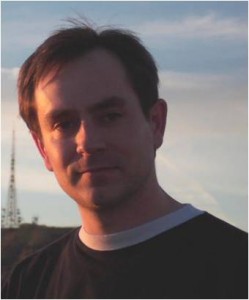 David A Fulton is a Lecturer at Newcastle University in the UK. A native of the town of Kilbirnie in North Ayrshire, Scotland, he received his BSc (Hons) from Strathclyde University in 1996 and PhD in 2001 from the University of California, Los Angeles under the direction of Prof Sir J Fraser Stoddart FRS, working on cyclodextrin and supramolecular chemistry. After a brief spell in industry he then spent two and half years as a postdoctoral research associate with Prof David Parker FRS at the University of Durham working on the synthesis of gadolinium-centered dendrimers as new MRI contrast agents. In 2006 he moved up the road to Newcastle to take up his present position within the School of Chemistry, where he went about establishing a polymer chemistry laboratory. His research interests are focused on using synthetic polymer chemistry to address problems in medicine, nanoscience and materials science.
David A Fulton is a Lecturer at Newcastle University in the UK. A native of the town of Kilbirnie in North Ayrshire, Scotland, he received his BSc (Hons) from Strathclyde University in 1996 and PhD in 2001 from the University of California, Los Angeles under the direction of Prof Sir J Fraser Stoddart FRS, working on cyclodextrin and supramolecular chemistry. After a brief spell in industry he then spent two and half years as a postdoctoral research associate with Prof David Parker FRS at the University of Durham working on the synthesis of gadolinium-centered dendrimers as new MRI contrast agents. In 2006 he moved up the road to Newcastle to take up his present position within the School of Chemistry, where he went about establishing a polymer chemistry laboratory. His research interests are focused on using synthetic polymer chemistry to address problems in medicine, nanoscience and materials science.
His group webpage can be found at: www.dafresearchgroup.com.
What was your inspiration in becoming a chemist?
I was always interested in science as a child, and when I got to high school chemistry was by far my favourite and best subject, and that led me to study chemistry at degree level and beyond. Perhaps a more interesting question is why my research interests focus on polymer chemistry when my background is in cyclodextrin chemistry (PhD work) and MRI contrast agents (Postdoctoral work)! Firstly, the advances in synthetic polymer chemistry over the last 15 years or so really caught my attention. I’d always had some interest in large molecules, and here were methods to easily prepare them with surprisingly high levels of precision, and I felt I would be able to do some useful work with these synthetic methods. Secondly, but perhaps more importantly, because polymers are ubiquitous in the world around us, I felt there would be more opportunities to become involved with research projects tackling real-world problems. Because of these reasons, when I got my independent appointment at Newcastle in 2006 I decided to initiate a research program in polymer chemistry. It’s been a steep learning curve moving into a new field, but I think my group have made good progress over the last three-four years.
What was the motivation to write your Polymer Chemistry article (entitled: “Investigating templating within Polymer-Scaffolded Dynamic Combinatorial Libraries“, DOI:10.1039/C2PY20600E)?
We became intrigued by the possibility of making wholly-synthetic analogues of natural proteins. Since I’d been following the developing field of dynamic combinatorial chemistry since my PhD days, I thought it would be interesting to try to take principles from this field and apply them towards the discovery of synthetic macromolecules which may possess molecular-recognition properties. We developed the concept of the “polymer-scaffolded dynamic combinatorial library (PS-DCL), and with generous funding from EPSRC we’re seeing just how far we will be able to take this concept. This article helps us understand better how some important structural factors of the polymer scaffold influence how the libraries respond to the addition of templates, and is an important step forward in our development of the concept.
Why did you choose Polymer Chemistry to publish your work?
The most important reason is that I feel that many polymer chemists actually follow the journal and therefore it would be more likely that people might read our article. Furthermore, although this is only my second article in Polymer chemistry, I’ve found that our manuscripts have been processed very swiftly and fairly with surprisingly thorough peer-reviewing. These are important factors when considering where to send a manuscript which members of your research group have put a huge amount of effort into. Finally, I think the journal is also publishing some very nice work, and this will help increase the prestige of the title.
In which upcoming conferences may our readers meet you?
I can take this an opportunity to plug a session which I am co-organizing with Brent Sumerlin at the ACS spring meeting in Dallas 2014 on the utilization and exploitation of dynamic covalent bonds in polymer science. Next year I will probably try to get to the European Polymer Federation meeting in Pisa.
How do you spend your spare times?
As the father of a one-year old daughter, I rarely have free time. When I’m not at work I’m usually doing things with my wife and daughter. I still try to play soccer every Friday evening with the PhD students and postdocs who work in my building, but I find that they constantly stay around the same age of twenty-something whilst I get older every year.
Which profession would you choose if you were not a scientist?
It’s easy to think of the professions I wouldn’t want to do, but harder to think of the ones where I would have the required levels of talent and drive to be able to make a living. I think I have a good enough feel for numbers and just enough creativity that I could probably do something connected with money and finance.










